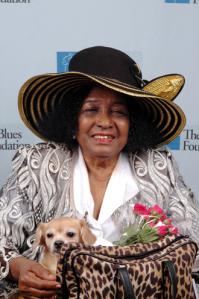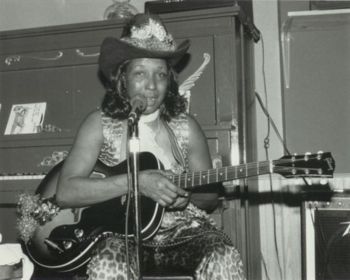JESSIE MAE HEMPHILL / “Standing In My Doorway Crying”
How old it is? I don’t know. They said it’s African, back in African times, that’s what they say, I don’t know, I wasn’t thought of. And they say drums was a-calling. If a person ceased, and you carry them to the cemetery, loaded in the wagon, all them drums get behind them and marched, just like it was a hearse, and they brought them to the cemetery, playing the drums.*I don’t know enough about blues to understand the vagaries of the various categories. Country blues, Delta blues, Rural blues, Mississippi Hill blues—I can’t tell one from the other. But I do know good music when I hear it. And I know this: Jessie Mae Hemphill can sing and play the blues.
—Fife player and blues musician, Otha Turner, on the history of Northern Mississippi ‘fife and drum’ music

According to her bio, Hemphill, the daughter of a fife (wooden flute) player and sharecropper in rural Mississippi, played in various blues bands in and around Memphis, Tennessee for most of her adult life. She began as a drummer, but gradually began to play more and more guitar. In the ‘70s, Hemphill moved back to the small country town in Northern Mississippi where she was from, but she kept playing the blues.
Finally, in 1980, she made her recording debut with a 7” single that included our feature track, “Standing In My Doorway Crying.” The success of that single led to a full-length album, She-Wolf, and eventually to international tours and festivals as well as a second studio album and a live release. In 1991, Hemphill’s Feelin’ Good LP received the W.C. Handy award for ‘Best Acoustic Release.’ Things seemed to be going well, but in 1993, Hemphill suffered a major stroke and could no longer play guitar. After the stroke, she returned to Northern Mississippi and lived there in a trailer—alone and in virtual poverty, by all accounts. Hemphill never played the blues again, although she did continue to sing and play tambourine at church until she died a little more than a month ago in July of 2006.

So what makes Hemphill’s music notable? For me, it’s the hypnotic feel of her rhythms mixed with the effortless, almost inattentive way she sings. Hemphill sings the way black people in New Orleans talk—with a lot of emphasis on expression and emotion, but with virtually no interest in ‘proper’ pronunciation or diction. I may be listening to Hemphill music as reproduced via a shiny plastic disc and thousands of dollars worth of electronics, but when she sings “Oh, baby / I was standing in my doorway crying,” I can see her standing there on her porch, guitar strings vibrating, tambourine bells clanging, singing her behind off.
Did I just say guitar and tambourine? Yeah, I did. On “Standing In My Doorway Crying” Hemphill plays both instruments, but there’s no overdubbing involved. Hemphill plays the guitar with her hands while she plays the tambourine with her foot—a holdover from her days as a drummer. In effect, she creates her own polyrhythms. Musician magazine called her guitar playing “gracefully idiosyncratic” and it’s a great way to put it. Hemphill doesn’t solo. She plays rhythm only—twisting, intricate rhythms that sound simple enough until you really pay attention to each note, each sound she’s producing. Then you realize you’ve never really heard anyone play rhythm guitar quite the way she plays.
Even when she’s accompanied by other musicians, Hemphill’s overall sound remains minimalist. Yet, even when she plays alone, her tunes feel full and round. There’s nothing missing. Listen to the way her guitar riffs circle back into themselves on “Take Me Home With You, Baby” (also from She-Wolf). Between the warm glow of Hemphill’s voice, the dry stomping of her foot, and those beautiful guitar lines, it sounds like there’s an entire band playing when, in actuality, it’s just Hemphill herself.
Most of Hemphill’s material was drawn from traditional or current blues and folk songs, and, later in her career, she sang a lot of gospel tunes. She didn’t do a lot of originals, and the ones she did do—like “Standing In My Doorway”—sound mostly improvised. I like the way Hemphill’s songs seem to stop and start almost arbitrarily, not unlike the way early hip-hop records did. It’s music made for dancing and singing and living, not just for listening. I know they say all good things must come to an end, but I wouldn’t mind a bit if these songs could go on forever.
—Mtume ya Salaam
* Otha Turner quote from “African-American Music from the
Mississippi Hill Country: ‘They Say Drums was a-Calling.’” Available at http://www.aliciapatterson.org/APF1902/Steber/Steber.html
Self-taught Negrodial shit
Negroes never let ignorance stop them from doing stuff. And when it comes to music, our ignorance towers over most other musical brilliance. Kalamu, what you talking about? I’m talking about how when we decide to express ourselves through music and be formally untrained but instinctively talented, and how we go with our feelings and make whatever the vehicle go where we want it to go. So yeah, put the tambourine on the floor and step on it. Take out a knife and slide it along the guitar strings. Who else you think would think of turning a turntable into a musical instrument?
Jessie Mae got some of that Lightnin’ Hopkins feel up in her style. It’s basically just self-expression with some rhythms to make it go down more better. Notice also that this is conversational in tone, like: come crawl up on my porch, sit at my feet and listen whilst I lay some true lies on you. Come close, chile, my throat ain’t up to no hollering.
Ain't it wonderful that this style of music, which is old as Mississippi mud, is still contemporary?!?! Miss Jessie, thank you, thank you for ‘splaining it to us.
—Kalamu ya Salaam
This entry was posted on Sunday, September 3rd, 2006 at 1:03 am and is filed under Contemporary. You can follow any responses to this entry through the RSS 2.0 feed. You can leave a response, or trackback from your own site.
One Response to “JESSIE MAE HEMPHILL / “Standing In My Doorway Crying””
July 14th, 2010 at 10:36 am
Dude, wicked review. You got it spot on man! Just real, raw talent. You don’t need no formal training to be a musician, not a real musician anyway. Creativity and raw feeling makes this great woman what she is. Thanks for the inspiring words dude 🙂
Leave a Reply
| top |